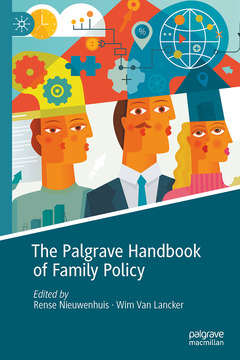Section 1. Introduction.- 1. A Multilevel Perspective on Family Policy; Rense Nieuwenhuis & Wim Van Lancker.- 2. Conceptualizing and Analyzing Family Policy and How it is Changing; Mary Daly.- Section 2. Supra-National.- 3. Beyond the National: How the EU, OECD and World Bank do FAmily Policy; Jane Jenson.- 4. Do International Organizations Influence Domestic Policy Outcomes in OECD Countries?; Linda A. White.- 5. What Does the UN Have to Say About Family Policy? Reflections on the ILO, UNICEF and UN Women; Shahra Razavi.- Section 3. National.- 6. Conceptual Approaches in Comparative Family Policy Research; Hannah Zagel & Henning Lohmann.- 7. Conceptualizing National Family Policies: A Capabilities Approach; Jana Javornik & Mara A. Yerkes.- 8. Early Childhood Care and Education Policies That Make a Difference; Michel Vandenbroeck.- 9. Family Policies and Family Outcomes in OECD countries; Willem Adema, Chris Clarke & Olivier Thévenon.- 10. Family Policies Across the Globe; Fernando Filgueira & Cecilia Rossel.- 11. Gendered Tradeoffs; Jennifer L. Hook & Meiying Li.- 12. Separated Families and Child Support Policies in Times of Social Change: A Comparative Analysis; Christine Skinner & Mia Hakovirta.- 13. Dual-earner Family Policies at Work for Single-parent Families?; Laurie C. Maldonado & Rense Nieuwenhuis.- 14. Policies for Later-life Families in a Comparative European Perspective; Pearl A. Dykstra & Maja Djundeva.- 15. How Well Do European Child-Related Leave Policies Support the Caring Role of Fathers?; Alzbeta Bartova & Renske Keizer.- 16. Parentalization of Same-Sex Couples: Family Formation and Leave Rights in Five Northern European Countries; Marie Evertsson, Eva Jaspers & Ylva Moberg.- Section 4. Sub-national.- 17. Breaking the Liberal-Market Mold? Family Policy Variation Across U.S. States and Why it Matters; Cassandra Engeman.- 18. Family Policy in the United States: State-Level Variation in Policy & Poverty Outcomes from 1980 to 2015; Zachary Parolin & Rosa Daiger Von Gleichen.- 19. Going Regional: Local Childcare Provision and Parental Work-care Choices in Germany; Pia S. Schober.- 20. Private Childcare and Employment Options: The Geography of the Return to Work for Mothers in the Netherlands; Tom Emery.- Section 5. Organizational.- 21. Company-level Family Policies: Who Has Access to it and What Are Some of its Outcomes?; Heejung Chung.- 22. The Educational Gradient in Company-level Family Policies; Katia Begall & Tanja van der Lippe.- 23. Managing Work-life Tensions: The Challenges for Multinational Enterprises (MNEs); E. Anne Bardoel.- Section 6. The Next Decade of Research.- 24. Childcare Indicators for the Next Generation of Research; Sebastian Sirén, Laure Doctrinal, Wim Van Lancker & Rense Nieuwenhuis.- 25. Family Policy: Neglected Determinant of Vertical Income Inequality; Rense Nieuwenhuis.- 26. Conclusion: The Next Decade of Family Policy Research; Wim Van Lancker & Rense Nieuwenhuis.




